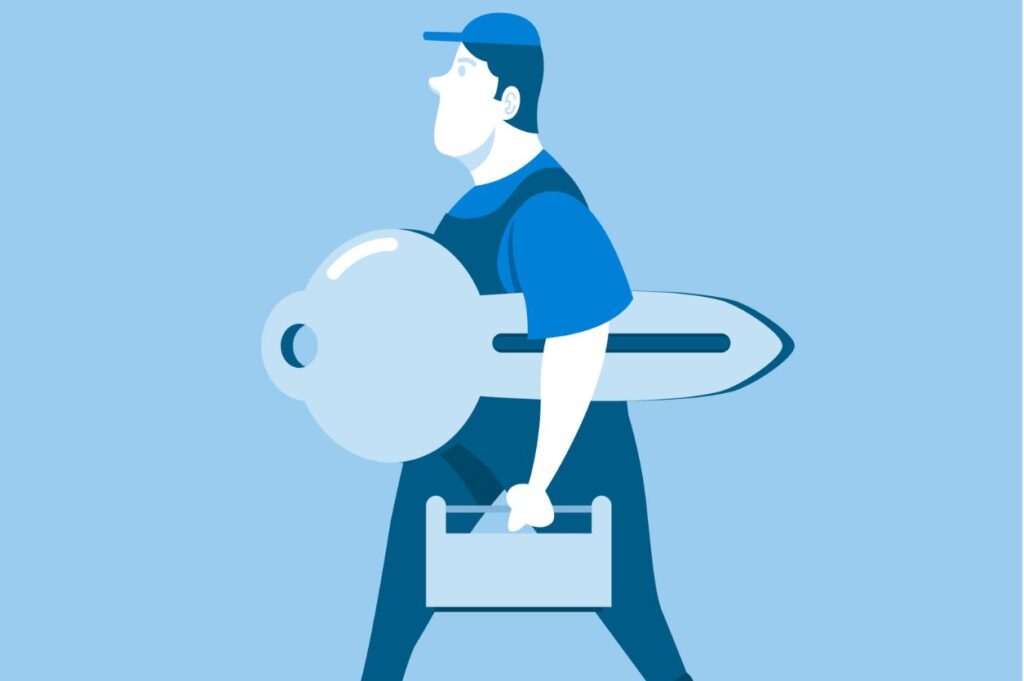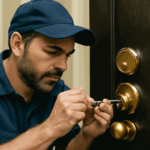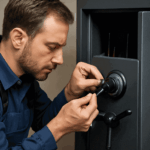If you’re someone who enjoys hands-on work, thrives on solving real-world challenges, and finds satisfaction in helping people feel secure, a career in locksmithing might be an ideal fit. They are essential professionals who help protect homes, vehicles, and businesses by ensuring that locking systems function safely and efficiently. In Virginia, this trade offers a steady demand for skilled professionals.
In this comprehensive guide, we will explain how to become a locksmith in Virginia, including licensing requirements, training options, and career prospects.
Why Choose a Locksmith Career in Virginia?
Virginia offers a strong job market for locksmiths due to its growing population and active real estate sector. Additionally, urban areas such as Richmond, Virginia Beach, and Fairfax present opportunities for locksmiths. Here are some reasons why you might want to pursue a career in locksmithing:
- Consistent Demand: The need for security services, including lock installations and repairs, remains high.
- Career Flexibility: You can work independently, for a company, or even start their business.
- Good Income Potential: Locksmiths specializing in automotive services or high-security systems tend to earn more.
- Quick Entry: Becoming a key expert doesn’t require a college degree—just practical training, proper certification, and a commitment to learning the trade.
Is a License Required to Become a Locksmith in Virginia?
In Virginia, locksmiths are required to obtain a license through the Department of Criminal Justice Services (DCJS), ensuring they meet the state’s professional and legal standards. This ensures that locksmiths meet certain standards and that the public can trust their work. The licensing process involves training, registration, and background checks.
How to Become a Locksmith in Virginia?

If you’re considering a hands-on, in-demand career that combines technical skills with real-world problem-solving, becoming a locksmith could be the perfect fit in Virginia. The process to enter this profession involves more than just learning how to pick locks—it requires proper training, certification, and adherence to the legal requirements set by the state. Below are the steps:
Step 1: Meet the Basic Requirements
Before starting your locksmith career in Virginia, you must meet a few basic qualifications:
- Be at least 18 years old
- Have a high school diploma or GED
- Be a U.S. citizen or legal resident
- Applicants must pass a criminal background check, meaning no felony convictions or serious criminal offenses that could impact public trust or safety.
Step 2: Complete Locksmith Training or Apprenticeship
One of the most important steps in becoming a successful locksmith in Virginia is acquiring the proper training. Whether you’re just starting or looking to advance your skills, you have several options for learning the trade. From formal educational programs to hands-on apprenticeship opportunities, each path offers unique advantages.
- Formal Training: Enroll in a specialized locksmithing program (either in-person or online).
- Apprenticeship: Work alongside an experienced key maker to learn the trade hands-on.
- On-the-Job Training: Some of the workers gain experience by working for a licensed locksmith business before pursuing full licensure.
The training will cover key topics such as:
- Understanding lock mechanisms and key duplication
- Working with electronic security systems
- Automotive locksmithing techniques
- Safe and vault servicing
- Customer service and business operations
Step 3: Apply for a DCJS Registration
Once you’ve completed your training and acquired the necessary skills, the next crucial step is to apply for registration for locksmith with the Virginia Department of Criminal Justice Services (DCJS). The DCJS is responsible for ensuring that key experts meet the state’s professional standards, ensuring public safety and security. It’s important to note that individuals with criminal records may face challenges, so if you’re concerned, read: Can a felon be a locksmith? This involves:
- Filling out the application on the DCJS website
- Paying a registration fee (usually $25 to $50)
- Providing proof of your training (minimum of 18 hours of instruction)
Step 4: Undergo Background Check & Fingerprinting
As part of the licensing procedure to become a locksmith in Virginia, you must undergo a criminal background check and submit your fingerprints to the Department of Criminal Justice Services (DCJS) for verification in Virginia. This step is crucial for several reasons. First and foremost, it helps ensure the safety and security of the public by verifying that locksmiths do not have a history of criminal activity that could jeopardize their ability to handle sensitive situations.
Step 5: Gain Hands-On Experience
While formal training and registration are essential steps in becoming a locksmith, gaining hands-on experience is arguably the most important part of your professional development. The practical skills you acquire through real-world experience are what truly prepare you to handle the diverse range of challenges you will encounter as a locksmith. After receiving your registration, you can:
- Work as an apprentice or a junior
- Join an established company
- Begin offering freelance services (if you have proper business licenses)
Best Locksmith Training Programs in Virginia
If you’re looking to become a licensed locksmith in Virginia, several well-regarded training programs can help you to get started. These locksmith programs offer both theoretical knowledge and practical experience, ensuring you’re well-prepared for your locksmith career in virginia. Here are a few reputable training programs available in Virginia:
| Institute Name | Location | Program Type | Website |
| Ashworth College | Online | Online Diploma | ashworthcollege.edu |
| Foley-Belsaw Institute | Online | Correspondence | locksmithtraining.com |
| Virginia Technical Academy | Newport News | In-person | vatechnical.com |
| ALOA Security Professionals Association | Varies (Online & Events) | Workshops & Certifications | aloa.org |
Note: Always ensure that the DCJS approves the program you choose.
Locksmith Certification and Continuing Education
While a license from DCJS is required to start work as a locksmith career in Virginia, certification from organizations like the Associated Locksmiths of America (ALOA) can enhance your credentials.
Popular certifications include:
- Registered Locksmith (RL)
- Certified Registered Locksmith (CRL)
- Certified Master Locksmith (CML)
These certifications demonstrate your expertise and can make you more attractive to potential employers or clients.
Continuing Education
Locksmith career in Virginia should regularly keep up with the latest industry trends and technological advancements to ensure they are offering the most effective and up-to-date services to their clients. Continuing education courses in:
- Smart locks and home automation
- Electronic access control
- Safe technology and manipulation
- Marketing and customer service
It can help you remain competitive in the field.
Tools and Equipment Every Locksmith Needs
As a professional locksmith, having the right tools and equipment is essential for completing jobs efficiently and accurately. Whether you’re working with residential, commercial, or automotive locks, the right toolkit ensures that you can tackle a wide range of tasks, from simple key duplication to complex lock installations. Maintenance tools are also essential—here are some of the best lubricants for door locks to keep your gear and customers’ locks working smoothly. A well-equipped locksmith should have:
- Key cutting machines
- Lock picks and tension tools
- Rekeying kits
- Code-cutting machines
- Automotive tools (for car lockouts)
- Mobile van with the necessary tools for emergency service
Average Salary of a Locksmith in Virginia
The average salary of a locksmith in Virginia can vary depending on factors such as experience, location, and the type of locksmithing services provided. However, locksmiths in Virginia can generally expect to earn a competitive salary within the trade.
| Experience Level | Average Salary per Year |
| Entry-Level Locksmith | $30,000 – $38,000 |
| Mid-Level (2–5 years) | $40,000 – $55,000 |
| Experienced Locksmith | $60,000+ |
| Self-Employed Locksmith | $70,000+ (varies) |
Income may be higher if you specialize in emergency services, high-security systems, or automotive locksmithing. For a broader breakdown, see our national salary guide: How much do locksmiths make?
FAQs About Becoming a Locksmith in Virginia
Q1: How long does it take to become a locksmith in Virginia?
It typically takes 3 to 6 months to complete the training and licensing process.
Q2: Do I need insurance to be a locksmith?
Yes, if you’re self-employed, liability insurance is recommended to protect yourself and your business.
Q3: Can I work without a license?
No, it is illegal to work as a locksmith in Virginia without being registered with the DCJS.
Q4: What’s the job outlook for locksmiths in Virginia?
The demand for locksmiths remains stable due to the need for security services in residential, commercial, and automotive sectors.
Q5: Can I specialize in automotive locksmithing?
Yes, specializing in car locksmithing is a lucrative niche with additional training and equipment.
Final Thoughts
Becoming a locksmith in Virginia offers a stable and rewarding career with excellent job security and growth opportunities. With the right training, licensing, and hands-on experience, you can pursue a flexible job in high demand across the state by going with this in-depth article of how to become a locksmith in Virginia. Whether you choose to work independently or for a company, Virginia’s strong market for skilled locksmiths ensures consistent opportunities. The profession allows for specialization, offering a chance to increase your expertise and earning potential. If you’re looking for a reliable and rewarding career, starting a career as locksmith in Virginia is a great choice.






